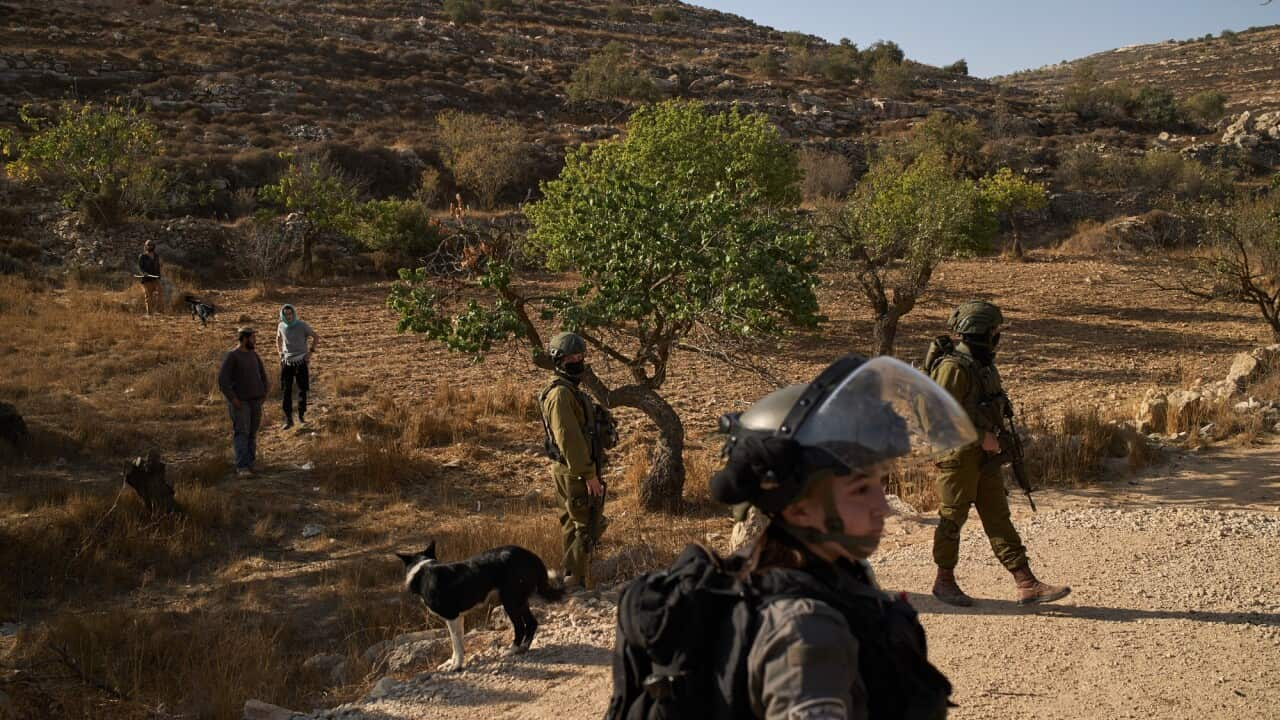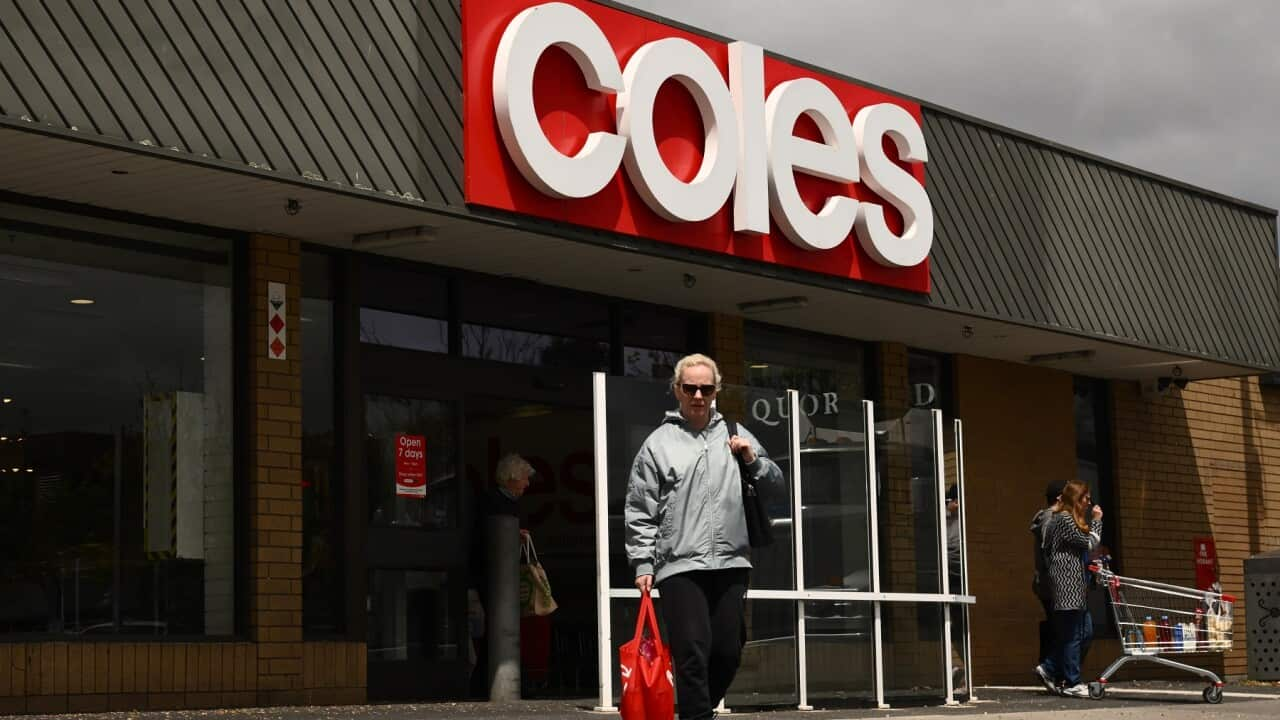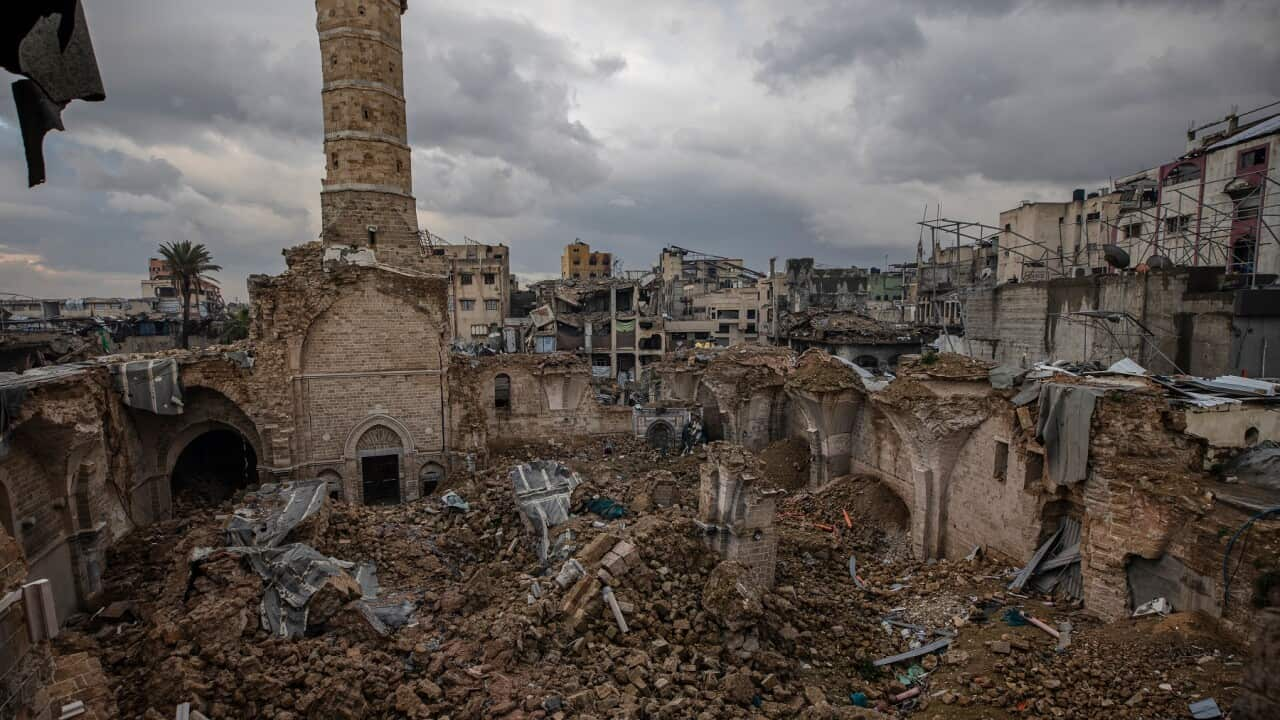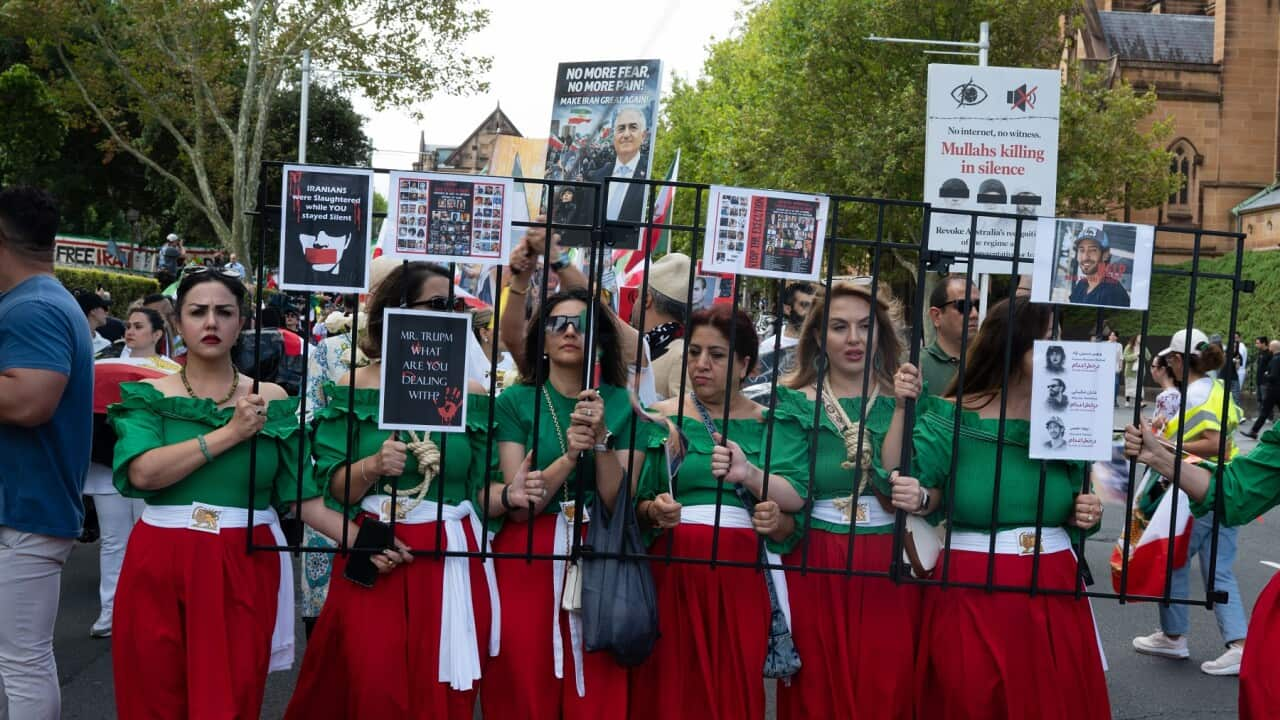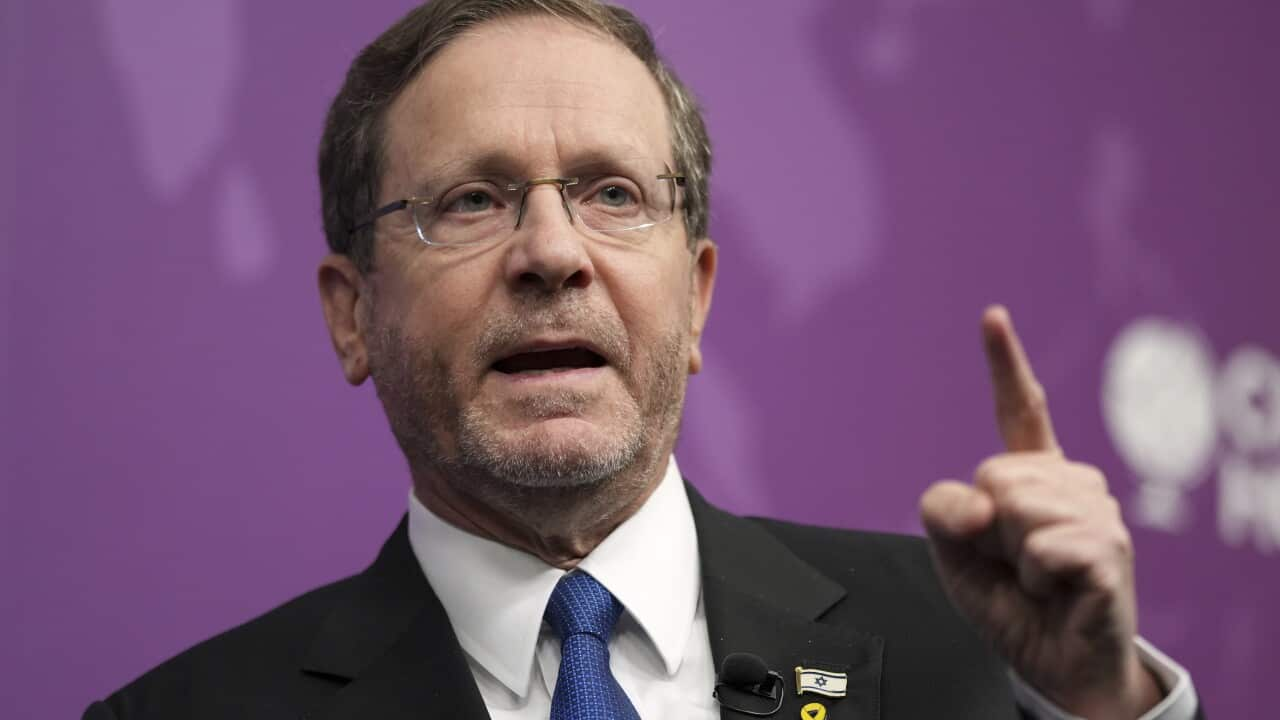Listen to Australian and world news, and follow trending topics with SBS News Podcasts.
(Sound of chatter and pots clanging)
Outside a charity kitchen in Gaza City, Palestinian children queue with empty bowls.
A fragile ceasefire is holding, but aid to Gaza remains well below what's needed.
This Palestinian mother, holding her infant, says skyrocketing market prices have put food out of reach for her young family.
"The situation is that prices are very high in the markets. That's why we completely rely on the tekeyah (Arabic word for charity kitchens), so we wait for it until it comes. We sit and wait for the cooks from when they are getting their equipment ready until they get the food ready and it is distributed. We wait for them. And if they don't come, we can't afford the extremely high prices."
While aid to the besieged enclave is slowly increasing, the World Health Organisation says thousands of trucks loaded with desperately-needed supplies still sit idly beyond Gaza's southern border with Egypt.
WHO Chief Tedros Adhanom Ghebreyesus has demanded Israel reopen the Rafah border crossing and allow more NGOs to operate.
"If the aid that's entering Gaza is significantly low, it cannot dent the hunger level. And the situation still remains catastrophic, because what's entering is not enough."
With the truce holding, the World Food Program is once again able to access its distribution list as Palestinians begin to return to their homes – or what's left of them.
It has 36 distribution centres already open, including nine in Gaza City, and is aiming to get back to 145.
But with only two operational crossings, the World Food Program's Antoine Renard says his organisation is facing a congestion problem.
"To best reach the population in Gaza, you actually need to have multiple entry points. And this is where, you know, you can do and push as much as you want, but with only two crossings that are open, you are facing clearly congestion."
Opening more crossings, especially into northern Gaza, and easing Israeli restrictions on spare parts needed for repair and equipment for humanitarian assistance, would also ensure that more aid reaches people.
But Israel has banned several items it deems as having "dual-use" over concerns they could be diverted for military purposes – a distinction Mr Renard totally rejects.
"We should not actually continue to discuss 'dual use'. One of the things that the ceasefire could bring is actually that we do a proper reset. Related to what humanitarian can do, related to how we need to serve two million people that are clearly dependent on our assistance."
Meanwhile, the United States is considering a proposal for humanitarian aid delivery in Gaza that would replace the controversial US-backed Gaza Humanitarian Foundation, the GHF.
Reuters news agency says its reporters have seen a copy of the plan.
UN figures say at least 859 people have been killed around GHF sites since the beginning of its operations in late May 2025.
The GHF has denied that aid seekers are being targeted.
A senior US administration official, speaking on the condition of anonymity, has told Reuters: "Multiple approaches are being considered to effectively get aid to the people of Gaza," adding that "nothing is finalised".
Plans to maintain the ceasefire are also being rolled out by the UN, working alongside humanitarian partners to implement a 60-day response plan.
But Danny Danon, the Israeli Ambassador to the UN, says peace cannot be achieved in the region "while terror still remains," and with the bodies of 13 hostages not returned.
"The world must keep the pressure where it belongs, on Hamas, to return the hostages, to lay down its weapons, and to honour the peace plan it signed."
Palestinian envoy to the United Nations, Majed Bamya is also hesitant to show optimism for peace.
"If after a century of conflict and dispossession and displacement and wars and occupation and colonisation and blockade and walls, if after the 7th of October, if after genocide in Gaza, we are not yet convinced that it is time for peace, that we owe future generations peace, what will ever convince us?"
In the occupied West Bank, it's olive-picking season.
The centuries-old practice is a vital part of the Palestinian economy and cultural life, relied upon by between 80,000 and 100,000 families for their income.
But it's regularly marred by confrontations between Israeli settlers and Palestinians, especially in areas near illegal settlements – like the southern village of Saeer.
(Sounds of yelling)
"Go out," one Israeli soldier shouts in Hebrew, while pushing settlers away as they tried to approach Palestinian farmers.
Amid mounting reports of settler violence during this year's picking season, Palestinian farmer Jabril Shlaldeh fears olive-picking is becoming impossible.
"There are daily attacks here, where they cut down our olive trees, and it's all documented. We film them stealing the olives, hitting them, and breaking the trees. It's all documented and photographed, and the wall committee has it, and the Israeli army was present. The army was there when the settlers fled. They also stole our sheep, as the army was there as well."
But the occupied West Bank is more broadly under threat.
A bill applying Israeli law to the territory has narrowly won preliminary approval from Israel's parliament – a show of support for annexation plans.
(Sound of applause)
The vote is the first of four needed to pass the law – and one pushed by the Knesset's hard-liners, including ultranationalists National Security Minister Itamar Ben-Gvir and Finance Minister Bezalel Smotrich.
It passed in a 25-24 vote.
US Vice President JD Vance, while in Israel, said the administration would oppose any annexation plans.
"I mean, look, if it was a political stunt, it was a very stupid political stunt. And I personally take some insult to it. The West Bank is not going to be annexed by Israel. The policy of the Trump administration is that the West Bank will not be annexed by Israel. That will continue to be our policy. And if people want to take symbolic votes, they can do that. But we certainly weren't happy about it."
But a political scientist says the result is a sign of a crisis within Prime Minister Benjamin Netanyahu's coalition government.
This is Gayil Talshir from the Hebrew University.
"It may be the case that this is a warning sign that should Netanyahu pursue normalisation with the Saudis and the second phase of the Gaza agreement, meaning that the Palestinian Authority will become part of the forces that are going to control Gaza the day after, he will have a problem with his own coalition."
In a statement, Mr Netanyahu's office later said the vote was a "deliberate political provocation" that aimed to sow division during Vice President Vance's visit.
Israel argues the territories it captured in the 1967 Six-Day War are not occupied in legal terms because they are on disputed lands.
But the United Nations' highest court and most of the international community regard them as occupied.
US Secretary of State Marco Rubio, also in Israel, said the Knesset's move towards the annexation of the West Bank could endanger President Trump's plan to end the bloodshed in Gaza.
But despite the uncertainty and unresolved questions, he's maintaining his administration's position of confidence.
"It's a very important achievement, but there's more work to be done and bigger achievements that lie ahead. And so we're here to work on that, and we feel very positive and confident that we're gonna get there despite substantial obstacles. We're gonna get there."
